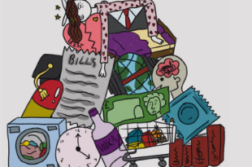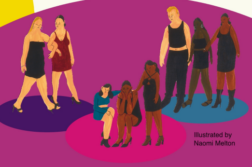The stigmatisation of mental health medication is prevalent in society and half the time it goes unnoticed.
I have been on medication since I was 16 years old. Many would say, ‘aren’t you too young to be on medication?‘, which is the start to the stigmatisation of mental health medication. For me personally, I cannot physically function without my medication. A day without my medication doesn’t go unnoticed: my behaviours change, and I become more erratic; a week without my medication and I am incredibly erratic, a danger to myself and reckless. These behaviours are due to my mental health condition which, thanks to my medication, can be stabilised to avoid these low lows and high highs. However, that doesn’t stop other people around me from giving me their suggestions on what will be more beneficial to me than my medication. Suggestions such as ‘eat more fruit and vegetables’, ‘do yoga or meditation‘, or, the best one yet, ‘take a berocca‘, which are attempts at being helpful, only add to the stigma surrounding mental health medication. Those who are on medication tend to need their medication to stay sane and alive; medication is incredibly important for the majority of individuals on them. All of the above examples can help me and others with mental health issues, but they will not heal the chemical imbalance in our brains – they cannot automatically ‘fix’ our mental health.
There is also an idea that anti-depressants are a ‘happy pill’, but the reality is anti-depressants do not make you any happier. Their primary function is to stop the two extreme emotions of ‘I’m ecstatic’ and ‘I want to die’. Their job is to level out all emotions, not by making you numb,but making sure you are not feeling too extreme an emotion, as they can become too much to handle for someone with a mental health condition. This may make anti-depressants seem undesirable for someone without any mental health issues, as they don’t make you feel any happier, but the truth is that those who are dependent on their medications aren’t on them to be happy, they are on them to stay alive. We need these pills to make sure our lows don’t take us to horrible places, but also, so we cannot experience the same highs which always eventually come crashing down and make us feel the lowest we have felt before. The concept of the ‘happy pill’ further adds stigma, as it makes it seem like an easy road to happiness, when the pill is truthfully to keep you on the road whilst your mind is trying to throw you off track.
All these examples can lead to self-stigmatisation, which is one of the most damaging concepts, as it enforces this view that we do not need our medication. For me personally, I have felt this immensely as I have flirted with medication, occasionally going off of my medication because I want to “feel again” or because ‘I don’t need them, only crazy people do‘. These dangerous thoughts are, for one, not correct at all, but have also been developed by the conceived notion of society’s view towards medication. The idea that only those who are “crazy”, those who embody Angelina Jolie’s character in ‘Girl, Interrupted’, should be on medication has been grown from the stigmatisation of medication. This stigmatisation is also shown through the romanticisation of musicians and artists with mental health issues. There is a common link between mental health and creativity, and the discussion of this link makes it seem that all creativity will be killed off once we start taking medication or engaging in any form of therapeutic help. I, myself, am a victim of this thinking. At 17 years old, I started to believe that my medication was the reason I was less creative than I was previously. But the truth is that, without my medication, I can’t concentrate or focus enough to even begin to think about creating.
Not everyone needs medication, and this is not to say everyone with mental health issues should instantly jump to taking medication. The easy access of medication is also dangerous, especially given the high numbers of GPs giving university students medication before trying any other method of therapeutic help. However, the harsh reality is that the majority of individuals suffering with severe mental health issues will need to take medication to keep them alive. My therapist once told me “if you had a heart problem and were told to take medication for you to stay alive you wouldn’t bat an eyelid, so why is it not the same for your mental health?”. This comment right here is the start to taking away the stigma – mental health is just as important as physical health and, just like physical health, you may need to take medication for your mental health to be okay.



